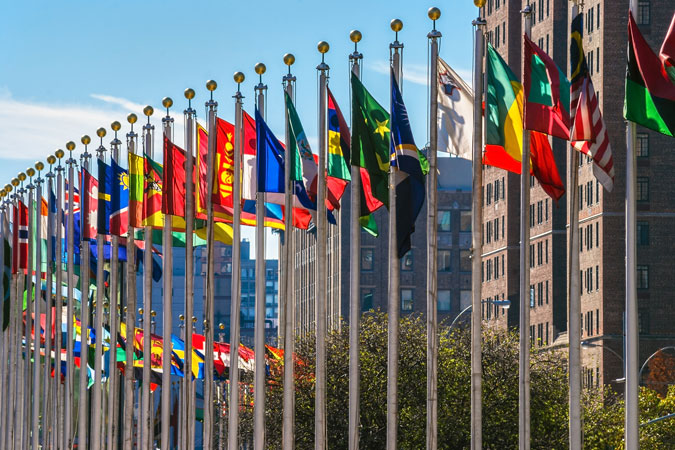Published today in the International Journal of Cancer*, a major review of published research has found that certain key factors could impact the risk of death for women after a breast cancer diagnosis.
As part of World Cancer Research Fund International’s Global Cancer Update Programme, housed at Imperial College London, the review sought to understand the links between body weight, physical activity, diet and the risk of death after a breast cancer diagnosis.
Key findings of the review after a breast cancer diagnosis
Body weight
- Strong evidence that higher body weight, after diagnosis, increases the risk of death.
- 226 studies were analysed from around the world, comprising more than 456,000 women with breast cancer; among them, 36,000 died, 21,000 of breast cancer.
Physical activity
- Some evidence that being more physically active could reduce the risk of death after a breast cancer diagnosis.
- Some evidence that physical activity could reduce the risk of breast cancer recurrence.
- 23 studies were analysed from around the world, comprising more than 39,000 women with breast cancer; among them, around 5,000 died, 2,000 of breast cancer.
Most studies looked at recreational physical activity, such as aerobics, walking and running, with limited studies on other types of activity.
Diet
- Some evidence that eating more dietary fibre could reduce the risk of death.
- Some evidence that eating soy could reduce the risk of death, as well as breast cancer recurrence.
- Some evidence that people with certain healthy eating patterns* have a reduced risk of death.
- 108 studies were analysed from around the world, comprising more than 151,000 women with breast cancer; among them, 14,900 died, 5,900 of breast cancer.
Breast cancer is the most common type of cancer among women in the UK, with 56,987 new cases in 2019. Three in 10 new cases of cancer in women in 2019 was breast cancer.
In 2020, globally, breast cancer was the most common cancer among women. There were an estimated 2.3 million cases and 700,000 deaths. As of the end of 2020, there were 7.8 million women worldwide living at least five years after a breast cancer diagnosis.
Researchers and healthcare professionals are invited to join a panel of experts who contributed to the breast cancer reviews at a Hot Topics in Nutrition & Cancer: Diet and Breast Cancer Survivorship on the 25 October 1:00–2:30 PM ET (6:00–7:30pm BST).
Dr Helen Croker, Head of Research Interpretation at WCRF International, said:
For over 20 years our Recommendations have supported the creation of an environment where individuals can pursue, and governments can support, healthier choices to reduce cancer risk.
We now hope to develop a set of recommendations specifically for people living with and beyond cancer so that, alongside their healthcare team, they have the latest evidence-based information about healthy eating, physical activity and weight. Analysing and interpreting the existing literature is the first step towards these efforts.
Nikki Bednall, diagnosed with stage 3 breast cancer in 2017, said:
After my diagnosis and treatment, I made a few lifestyle changes to reduce my risk of health problems. These included maintaining a healthy weight, eating a variety of healthy foods and exercising regularly.
I know from experience the feeling of jumping through hoops after a cancer diagnosis. However, as the evidence from these reviews gets stronger it gives me greater confidence that there are things I can do to help improve my chances of living beyond my breast cancer.
Dr Doris Chan, co-author at Imperial College London, said:
Many women living with breast cancer seek lifestyle advice. It is important that they have access to reliable information about healthy living.
The findings from these reviews strengthen the case for women with breast cancer to be supported by their healthcare team to make positive behaviour changes. These could include eating a healthier diet and being physically active, all of which play a role in maintaining a healthy weight.
Ends
For all media enquiries contact please contact Melanie Marks Purnode at m.purnode@wcrf.org
Notes to editors
*All four published papers can be found here:
Post-diagnosis body fatness, recreational physical activity, dietary factors and breast cancer prognosis: Global Cancer Update Programme summary of evidence grading. https://doi.org/10.1002/ijc.34320
Post-diagnosis recreational physical activity and breast cancer prognosis: Global Cancer Update Programme systematic literature review and meta-analysis. https://doi.org/10.1002/ijc.34324
Post-diagnosis body fatness, weight change and breast cancer prognosis: Global Cancer Update Programme systematic literature review and meta-analysis. https://doi.org/10.1002/ijc.34322
Post-diagnosis dietary factors, supplement use and breast cancer prognosis: Global Cancer Update Programme systematic literature review and meta-analysis. https://doi.org/10.1002/ijc.34321
** In these studies, the dietary patterns were specific patterns such as a low fat and high fibre/ fruit/ vegetable diet and following the WCRF/ AICR Cancer Prevention Recommendations.
“Body weight” is a simplified term to cover a range of anthropometric measurements in the review including body mass index (BMI), waist circumference and waist-hip-ratio.
“Some evidence” refers to a ‘limited suggestive’ conclusion. This means that there is evidence of an effect but there are issues with the evidence which could include the amount of research available or the quality of the research. The Panel of experts uses a grading criteria to ensure the evidence is judged appropriately.
About Global Cancer Update Programme
World Cancer Research Fund International’s flagship Global Cancer Update Programme provides an analysis of international scientific research into how diet, nutrition, physical activity and weight affect cancer risk and survival. The programme is produced in partnership with American Institute for Cancer Research, World Cancer Research Fund in the UK and Wereld Kanker Onderzoek Fonds in The Netherlands.
As part of its development the Global Cancer Update Programme has built the largest cancer prevention database in the world, housed at Imperial College in London. It is the only authoritative scientific resource of its kind, is evaluated by an independent Panel of leading cancer experts and to date contains approximately 12,000 papers on cancer prevention and survival.
About World Cancer Research Fund International
World Cancer Research Fund International examines how diet, nutrition, body weight and physical activity affect your risk of developing and surviving cancer. As part of an international network of charities, we have been funding life-saving research, influencing global public health policy, and educating the public since 1982.
While society continues searching for a cure, our prevention and survival work is helping people live longer, happier, healthier lives – free from the devastating effects of cancer. www.wcrf.org and Twitter, Facebook, YouTube & LinkedIn.
About Imperial College London
Imperial College London is one of the world’s leading universities. The College’s 20,000 students and 8,000 staff are working to solve the biggest challenges in science, medicine, engineering and business.
Imperial is University of the Year 2022 in the Times and Sunday Times Good University Guide. It is the world’s fifth most international university, according to Times Higher Education, with academic ties to more than 150 countries. Reuters named the College as the UK’s most innovative university because of its exceptional entrepreneurial culture and ties to industry.
Imperial has a greater proportion of world-leading research than any other UK university, according to the Research Excellence Framework (REF). Imperial ranks first in the UK for research outputs, first in the UK for research environment, and first for research impact among Russell Group universities.
The new Global Status Report on Physical Activity analyses data from 194 countries to assess progress against recommendations from the WHO Global Action Plan for Physical Activity, such as policies to create safer roads to encourage more active transport, and provide more programmes and opportunities for physical activity in key settings such as childcare, schools, primary healthcare and the workplace.
It shows that progress is slow and that countries need to accelerate the development and implementation of policies to increase levels of physical activity. Key findings from the report include:
- Less than half of countries have a national physical activity policy, of which less than 40% are operational.
- Only 30% of countries have national physical activity guidelines for all age groups.
- Just over 40% of countries have road design standards that make walking and cycling safer.
The report calls for countries to prioritise physical activity to improve health and tackle non-communicable diseases, integrate physical activity into all relevant policies, and develop tools, guidance and training to improve implementation.
World Cancer Research Fund’s evidence shows that being physically active decreases the risk of colon, breast and endometrial cancers, and also helps to maintain a healthy weight. The economic burden of physical inactivity is large, with 70% of healthcare expenditure in high-income countries spent on treating illness resulting from physical inactivity.
Kate Oldridge-Turner, Head of Policy and Public Affairs at World Cancer Research Fund, said:
This report clearly shows that much more needs to be done by almost all governments to create environments to reduce physical inactivity, so people can live longer and healthier lives.
Physical activity must be a priority for all countries, especially following the COVID-19 pandemic, and the current cost-of-living crisis. Now more than ever we need to help people become more active, not only to ensure a healthy and resilient population, but also to reduce healthcare expenditure in the long term.
World Cancer Research Fund International was delighted to act as a reviewer on this report.
Find out how we support and promote physical activity policy development and implementation through our MOVING policy framework and database.
Leading cancer prevention and survival research organisation, World Cancer Research Fund International (WCRF International) has today launched the Global Cancer Update Programme – ahead of the World Cancer Congress on 18–20 October. The Global Cancer Update Programme is a new and updated version of its flagship research programme – previously known as the Continuous Update Project – which includes the largest global cancer prevention and survivorship database in the world.
The Global Cancer Update Programme database contains over 12,000 papers on cancer prevention and survival. These have been synthesised and critiqued by over 140 scientists from 17 different countries. The programme analyses the findings from all the existing research, including the most recent research papers, and this produces strong evidence. Previous work in this area helped to underpin the development of the ground-breaking Third Expert Report, which assessed the evidence across 17 cancer types and included updates to WCRF International’s Cancer Prevention Recommendations1.
The key areas of focus for the future will be cancer incidence, cancer survivorship, cancer mechanisms, and obesity. For the first time ever, WCRF International will also be looking at the impact of food, nutrition, body weight and physical activity on children with cancer, from diagnosis through to adult life.
The Global Cancer Update Programme will be expanding into other new areas, including the impact of different dietary and lifestyle patterns, as well as the impact of factors in early life on future cancer risk. WCRF International will also be undertaking a brand-new series of reviews on cancer survivorship that will primarily focus upon breast, colorectal, and prostate cancer, as well as childhood cancers. Determining the impact that diet, nutrition, physical activity and body weight have on children with cancer (from diagnosis into adult life) has also been identified by the Global Cancer Update Programme Panel as a particular area of importance.
The findings from all of the research undertaken within the Global Cancer Update Programme will be judged by a Panel of independent global experts. They will judge the evidence, draw conclusions and make recommendations after each systematic review. This will allow WCRF International to make recommendations for breast, colorectal, prostate, and childhood cancer survivors within the next 5 years.
The processes that have been established within the Global Cancer Update Programme offer a unique and efficient approach to synthesising evidence and establishing evidence-based recommendations. Through refocusing its efforts, WCRF International is aiming to advance new knowledge and address critical gaps in cancer research.
Professor Lord John Krebs, Chair of the Global Cancer Update Programme, said:
The Global Cancer Update Programme is a one-of-a-kind research programme in its field. The new developments in its aims and focus areas will allow WCRF International to build on its extensive and existing cancer knowledge, equipping the scientific community to achieve an even greater ability to prevent, treat and manage cancer.
Marilyn Gentry, President at WCRF International Network, said:
First and foremost, cancer prevention is the basis of what we do at WCRF International – but our increasing priority is also to see cancer survival rates improve. We’re extremely proud to be the first organisation to have focused on the link between cancer, diet and nutrition. Now we can strive further with our Global Cancer Update Programme and deepen our understanding of cancer prevention and survival.
Dr Helen Croker, Head of Research Interpretation at WCRF International, said:
One in two of us will get cancer in our lifetime, yet we know that around 40% of cancers could be prevented through maintaining a healthy diet, physical activity and body weight, along with not smoking and avoiding sun exposure. We are looking forward to further deepening our knowledge and understanding about cancer prevention and survival with the launch of the Global Cancer Update Programme, and ultimately helping to reduce the number of people developing cancer or surviving from it.
Ends
Notes to Editors
For media enquiries contact: Marianne Kellner, Media & PR Officer at WCRF International on 07717131883 / m.kellner@wcrf.org
About World Cancer Research Fund International
World Cancer Research Fund International examines how diet, nutrition, body weight and physical activity affect your risk of developing and surviving cancer. As part of an international network of charities, we have been funding life-saving research, influencing global public health policy, and educating the public since 1982. While society continues searching for a cure, our prevention and survival work is helping people live longer, happier, healthier lives – free from the devastating effects of cancer. www.wcrf.org and Twitter, Facebook, YouTube & LinkedIn.
World Cancer Research Fund International’s Global Cancer Update Programme provides an analysis of international scientific research into how diet, nutrition, physical activity and weight affect cancer risk and survival. The programme is produced in partnership with American Institute for Cancer Research, World Cancer Research Fund in the UK and Wereld Kanker Onderzoek Fonds in the Netherlands. As part of its development, the Global Cancer Update Programme has built the largest cancer prevention database in the world, housed at Imperial College in London. It is the only authoritative scientific resource of its kind, is evaluated by an independent panel of leading cancer experts, and to date contains approximately 12,000 papers on cancer prevention and survival. A copy of the Global Cancer Update Programme strategy is available via the Press Office.
Preventing Cancer. Saving Lives.
1 WCRF International’s Cancer Prevention Recommendations are the conclusion of an independent panel of experts and represent a package of healthy lifestyle choices that help to reduce the likelihood of developing cancer. These include eating healthily, being active, maintaining a healthy weight and not smoking. Other ways include avoiding drinking alcohol, eating no more than three portions of red meat a week and little, if any, processed meat, breastfeeding if you can, and being safe in the sun.


